Students, professionals, and even researchers look for online courses to learn anywhere, anytime (SitePoint Premium is a perfect example!). However, if your WordPress website was already live and you want to create an online course using it, would you want to pay more to a developer to have that done? Definitely not! Being a freelancer or solopreneur, you want to create a secure and efficient platform with less (or no) cost. Do not worry, with WordPress you can easily create an online course system, using a learning management system plugin!
The term “Learning Management System” (LMS) is often used when discussing online courses. An LMS is a system used to create courses and training programs and typically also provides functionality to manage them. There are many LMS available online, such as Moodle, Canvas, etc. But if you have a WordPress website, then why not integrate your LMS into the same website? You can easily create secure and efficient online courses and then sell access to them to begin building your E-Learning business.
Why WordPress for Creating an Online Course?
Since WordPress is free, reliable, and easy to extend with plugins, you can create an online course with WordPress at a lesser cost. WordPress plugins for LMS have amazing features, so it is easy to use them to create a course from scratch.
After development of courses, you will need to maintain them. This can lead to maintenance costs; but the required time and costs can be less when using a WordPress LMS plugin. You may find yourself needing less maintenance for your course and lessons, since these plugins have extensions to do some maintenance work automatically.
Once you’ve planned the basics of your course – the title, the content, the membership or access plan – then you should begin considering which LMS plugin you’d like to use.
Learning Management System Plugins
LifterLMS
LifterLMS is a powerful LMS plugin that will help you easily create, and publish an engaging online course. It comes with a student dashboard, wherein learners can check their profile, course progress, profile, certificates, etc. It also has a personalized certificate system. Both online and offline payment is available for the learners who want to enroll in your course.
WP-Courseware
Courseware is a learning management plugin that comes with a system providing a dynamic progress page, question tagging, etc. Your course attendees can also download the quiz results using this plugin.
Within the Courseware plugin is a tool called “report cards” that has been integrated to create surveys and export grade books.
StudyPress
StudyPress will help you in creating multimedia learning content easily. They provide distraction free, full-screen mode features, so that it is easy for learners to access lessons. It also has an awesome drag and drop interface to create a course and lessons.
teachPress
The teachPress plugin supports localization. Your course can be created in more than two languages resulting in a wider reach. You can import the publications in BibTeX format. RSS feeds for publications are also provided.
The plugin also has shortcodes, so you can provide course overview on any WordPress post or page.
Sensei
Sensei is an LMS plugin that offers different designs for different courses. Provided by WooThemes, this plugin can be easily integrated with WooCommerce to sell courses online with ease.
Note: WooCommerce is considered one of the best platforms for creating E-Commerce websites. Its integration with LMS works like a charm for course creators as well as learners.
Educator
The Educator plugin provides shortcodes, making it easier for you to integrate on your WordPress page or posts. Multiple payment methods are supported by Educator, such as PayPal, bank transfer, check, etc.
Select the perfect plugin for course development. You definitely want to look at this one. Many LMS plugins have similar features to each other, but the unique features of each are what you have to make a decision based on. I have used more than a few, and consider WP-Courseware and LifterLMS the most useful for my own projects.
Developing a Course on Your WordPress Website
Now, you will see how to use an LMS plugin to start on a demo course from scratch.
For the demo, I will be using the plugin LifterLMS, which is a powerful learning management system. Here, you will see what can be done to create a valuable course for our audience, which can be engineers, professionals, researchers, etc.
Creating a Course
Let’s say you want a course on Java. You can easily create it using LifterLMS.
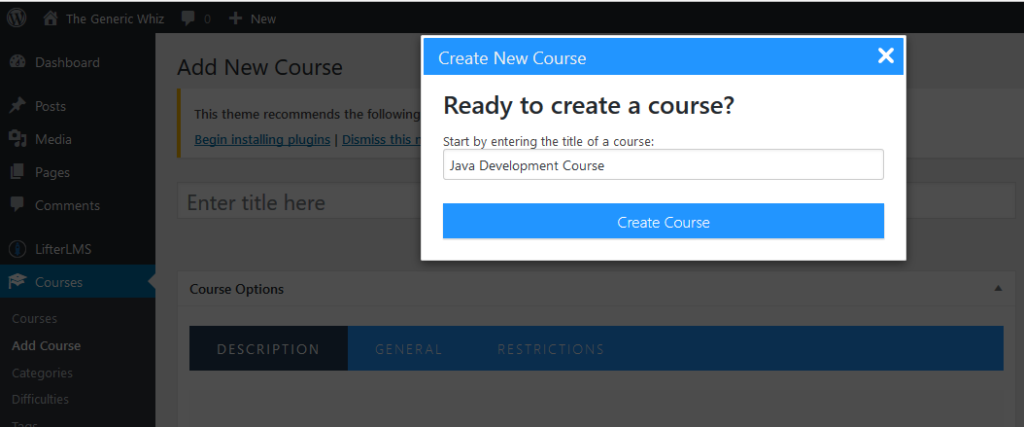
Figure 1: creating course with title “Java Development Course”
Creating Sections and Lessons
A course will consist of lessons. You can create lessons easily with the plugin. It can help to divide them according to sections. I have divided our course into two sections: “Core Java” and “Advanced Java.”

Figure 2.1: creating “Advanced Java” section in the course “Java Development Course”
Create any number of lessons and add under your course sections. Also, mark the duration of the lessons.
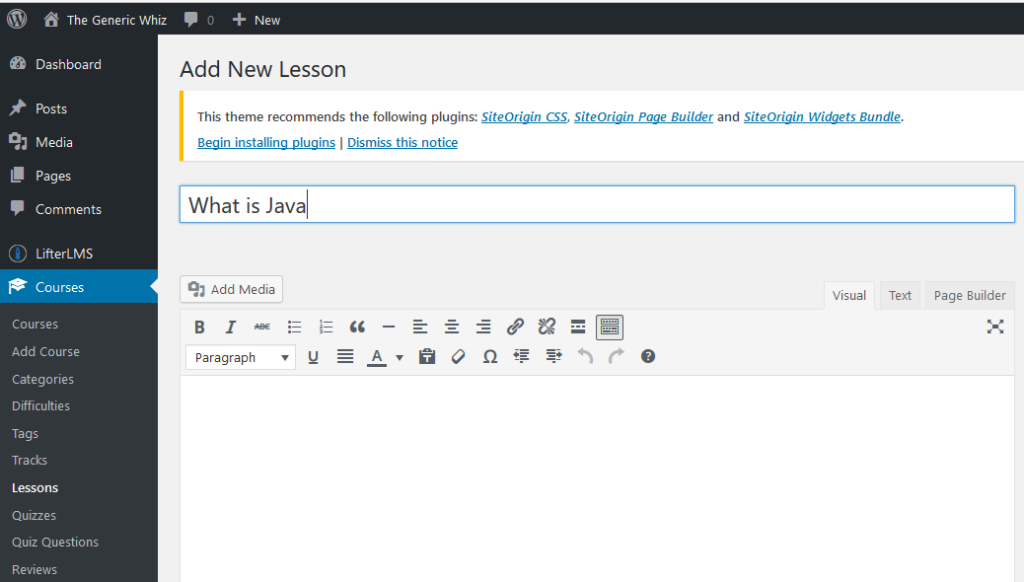
Figure 2.2: Creating first lesson
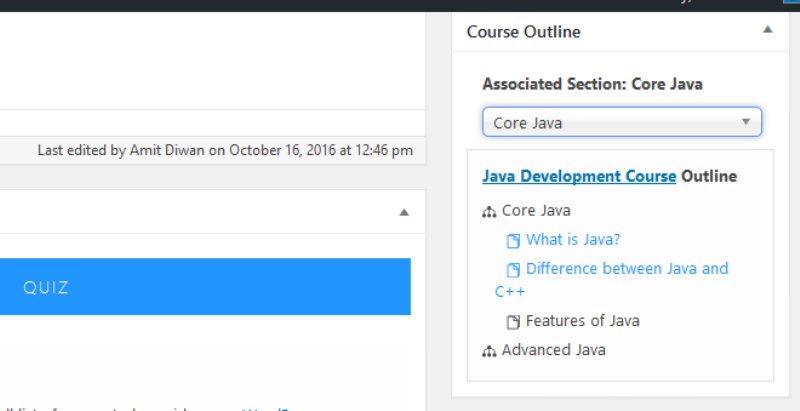
Figure 2.3: Adding lesson to section
Course Categories/ Tags
Categories in WordPress group your posts, but in LMS, course categories group your course lessons.
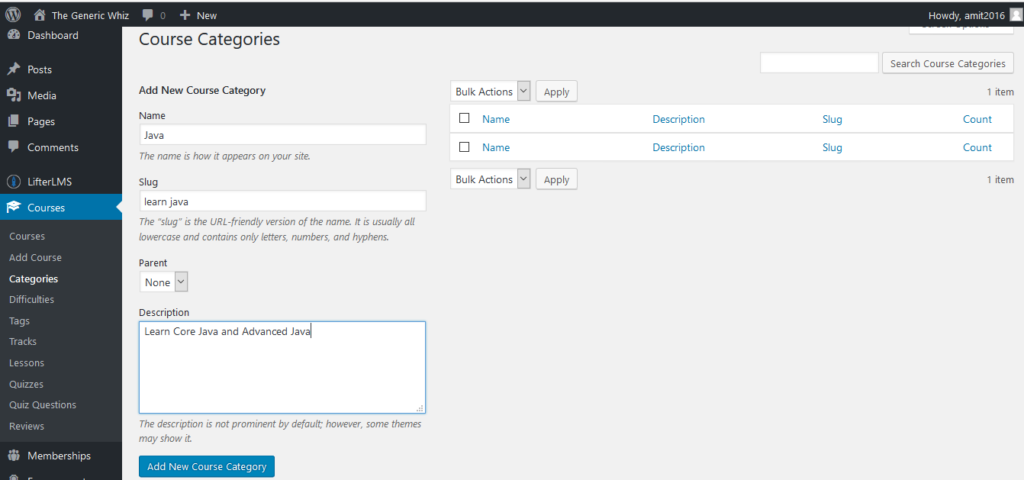
Figure 3: Category “Java” added
Student Assessment
A student or professional comes to your website to join a course. After completing a course, you will probably want the attendee to assess what they have learned from the course.
The assessment can be in the form of quiz questions. You can create questions for a quiz in the following form:
- Multiple Choice
- True/False
- Gap Fill
- Multi Line
- Single Line
In Figure 4:1, you will see how to create questions for a quiz to evaluate student performance.
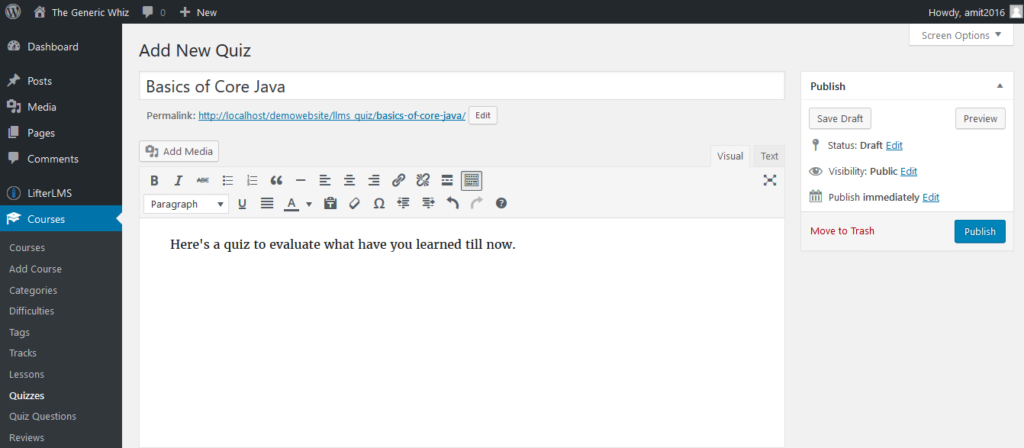
Figure 4.1: Quiz
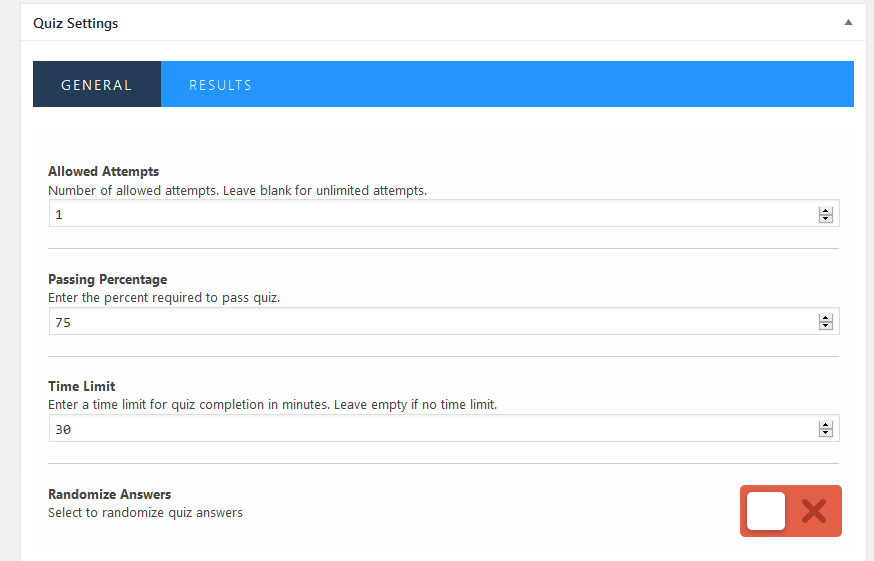
Figure 4.2: Settings for Quiz
Export Course List
Let’s say you started with a few courses on your WordPress website for students and professionals. After gaining success, the number of courses created on your website increased tremendously. So, to avoid chaos, you can easily export the course list in the XLS/CSV format. A course list consisting of fields and details can easily be generated by a click of a button.
Add-Ons / Extensions / Integration
Add-ons will create new functionality for your courses. You can use them to add more features to your course that prove to be quite beneficial.
Add-ons or extensions can include functionality through which you can easily check the course progress of any student. Extensions are also available to meet other needs, such as adding the ability to easily create media attachments.
Integration with other plugins is quite important to extend the functionality of your LMS. Integrate with BuddyPress, WooCommerce, or other plugins that you might wish to use in your WordPress site. For example, integrating with Gravity Forms will help you to create amazing forms in no time.
In Figure 5, you will see some extensions you can add to your LMS.
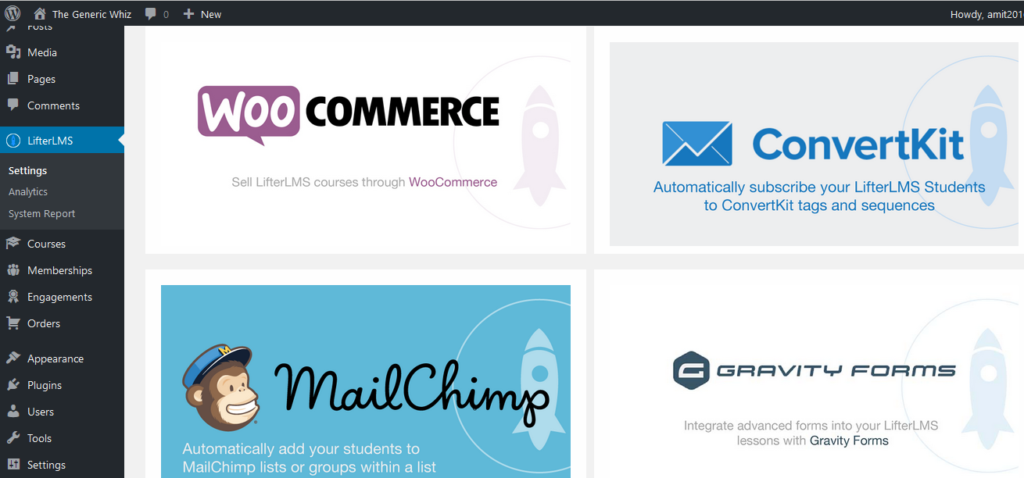
Figure 5: Add-ons
Free or Paid
You can keep your course free for your audience for an allotted amount of time, and after building your brand, you can sell it at a price suitable for your audience.
The learners do not have to worry about the payment services, since these LMS come with a lot of payment options, such as:
- PayPal
- WePay
- Skrill
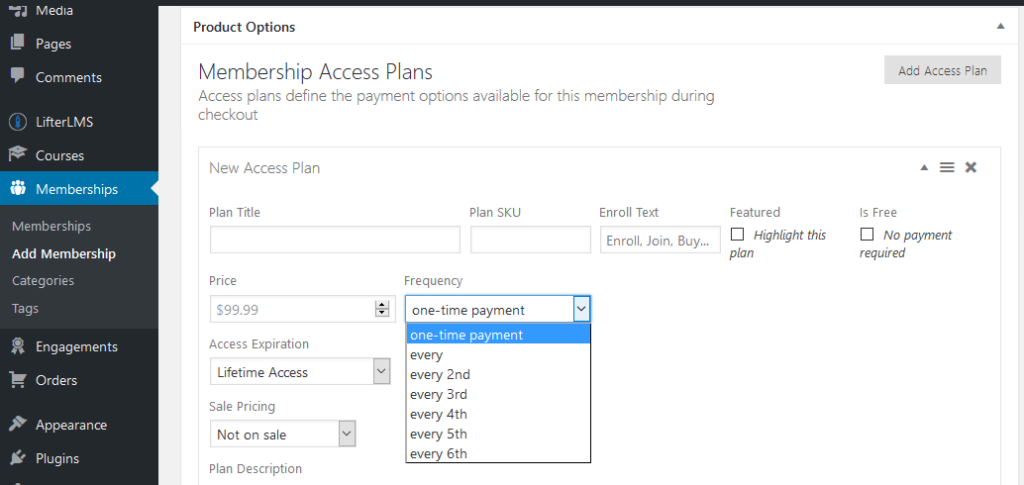
Figure 6: Payment options for paid courses
Course Certificates
You can easily manually or automatically generate certificates for learners after they complete the course successfully.
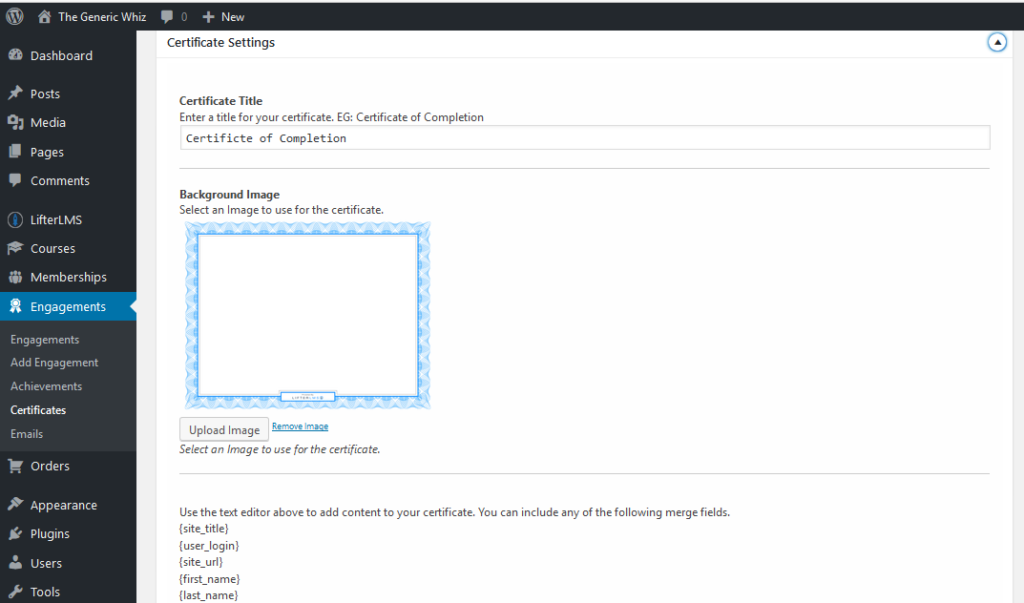
Figure 7: Create Certificates
Feedback / Reviews for Courses
Great feedback and ratings are what a course creator strives for. Not only the course creators, but also those who want to buy a course, check the reviews and ratings. So, an option is available for the attendees to leave a review after completing the course.
Localization
According to a survey on Internet users worldwide, the top Internet language is English. It cites English as the language of an estimated 25.5% of internet users of the world’s population. What about the rest? Target the global audience with the WordPress plugins localization feature. Develop courses in different languages and get a wide reach.
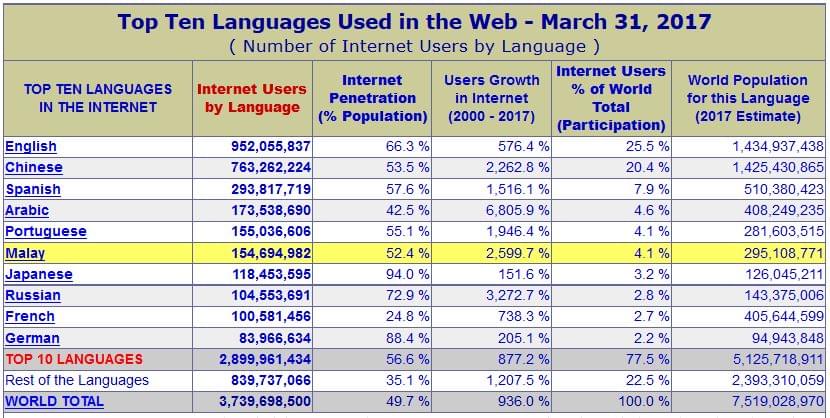
Figure 8: Survey; Source: Internet World Statistics
Summary
In this article, you learned how to create an online course in WordPress and deliver it on your website. You also learned how to extend the course with add-ons. Start your journey to an easier way to create a WordPress based course platform, which in turn will allow you to teach others!
Frequently Asked Questions about WordPress Learning Management System
What are the key features to look for in a WordPress Learning Management System (LMS)?
When choosing a WordPress LMS, you should consider several key features. Firstly, course creation and management should be straightforward and intuitive. The LMS should allow you to create and organize courses, add lessons, topics, quizzes, and assignments. Secondly, user management is crucial. The LMS should provide tools for managing students, tracking their progress, and providing feedback. Thirdly, consider the LMS’s integration capabilities. It should seamlessly integrate with other plugins and tools like WooCommerce for selling courses, bbPress for forums, and BuddyPress for social networking. Lastly, the LMS should provide robust reporting and analytics to help you track and improve your courses.
How can I sell my courses using a WordPress LMS?
Most WordPress LMS plugins integrate with eCommerce plugins like WooCommerce, allowing you to sell your courses directly from your website. You can set up different pricing models, including one-time purchases, subscriptions, and memberships. Additionally, some LMS plugins offer built-in payment gateways, so you don’t need to use an external eCommerce plugin.
Can I customize my courses with a WordPress LMS?
Yes, most WordPress LMS plugins offer a high degree of customization. You can design your courses to match your brand, add multimedia content like videos and images, and create interactive quizzes and assignments. Some plugins also offer advanced features like drip content, where you can schedule content to be released over time.
How can I track student progress with a WordPress LMS?
WordPress LMS plugins typically provide comprehensive tracking and reporting features. You can monitor student progress, see how they’re performing on quizzes and assignments, and get insights into their learning patterns. Some plugins also offer analytics tools to help you improve your courses based on student performance and feedback.
Can I use a WordPress LMS for corporate training?
Absolutely. WordPress LMS plugins are versatile and can be used for a variety of educational purposes, including corporate training. You can create courses tailored to your employees’ needs, track their progress, and provide feedback. Some plugins also offer features like certificates and badges to motivate and reward learners.
Is it possible to create a multi-language course with a WordPress LMS?
Yes, many WordPress LMS plugins support multi-language courses. They integrate with multilingual plugins like WPML, allowing you to create courses in different languages. This is particularly useful if you have a diverse student base or if you’re offering courses internationally.
Can I offer certificates and badges with a WordPress LMS?
Yes, many WordPress LMS plugins allow you to offer certificates and badges to students upon course completion. This can be a great way to motivate students and provide them with a tangible record of their learning.
How can I ensure my courses are accessible to all learners?
To ensure your courses are accessible, choose a WordPress LMS that complies with web accessibility standards. This includes features like keyboard navigation, screen reader compatibility, and color contrast options. Additionally, consider offering transcripts for video content and using clear, simple language in your course materials.
Can I create a community around my courses with a WordPress LMS?
Yes, many WordPress LMS plugins integrate with social networking plugins like BuddyPress, allowing you to create a community around your courses. You can set up forums for discussion, enable private messaging, and allow students to create profiles and connect with each other.
What kind of support can I expect from a WordPress LMS provider?
The level of support varies between different WordPress LMS providers. However, most offer comprehensive documentation, tutorials, and forums for self-help. Additionally, many providers offer direct support via email or live chat. Some also offer premium support plans for additional assistance.
 Amit Diwan
Amit DiwanAmit Diwan is a founder at Studyopedia, who has taught more than a million engineers and professionals on the following technologies: Python, Java, Android, WordPress, Drupal, Magento, JavaScript, jQuery, HTML5, Bootstrap 4, etc.




